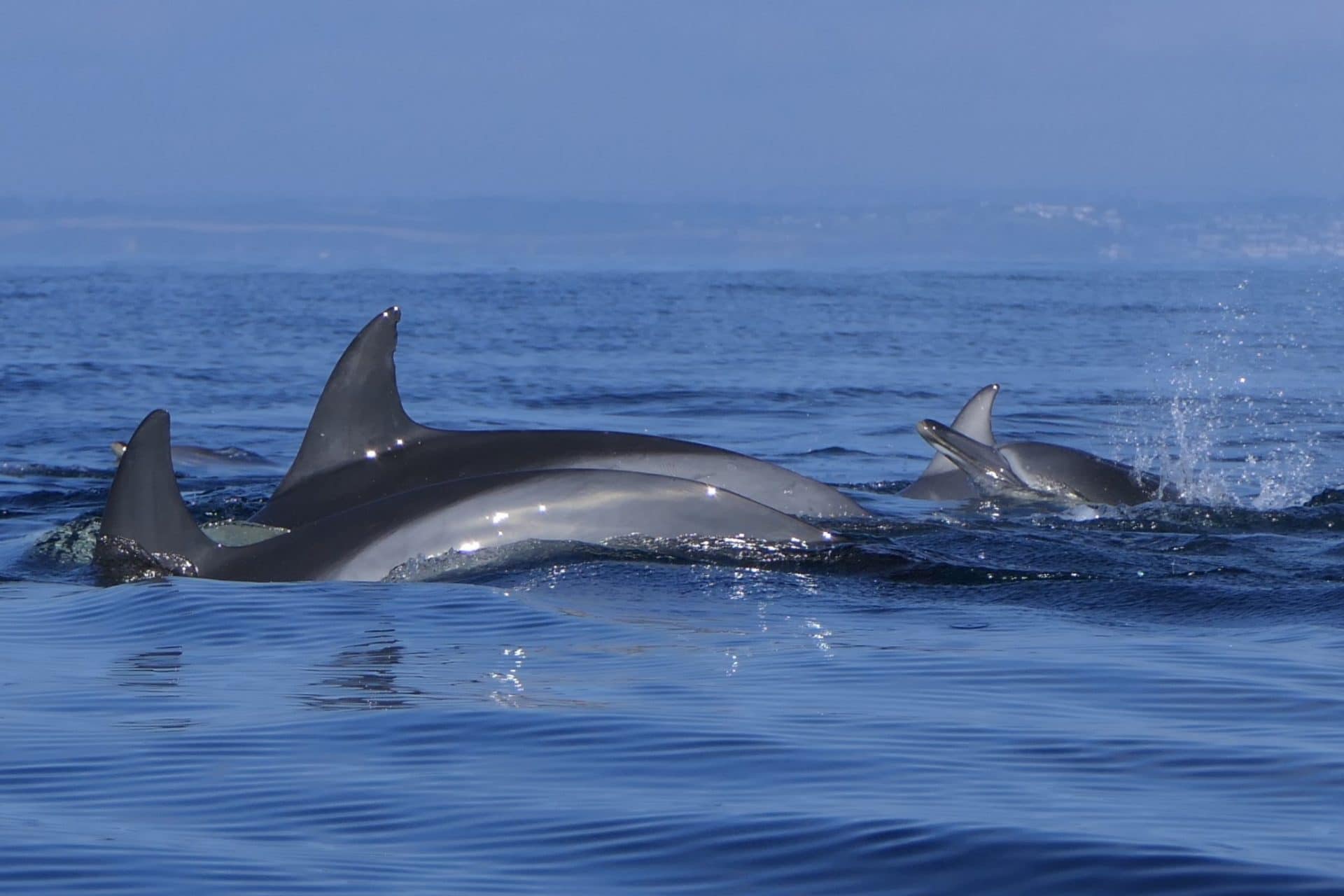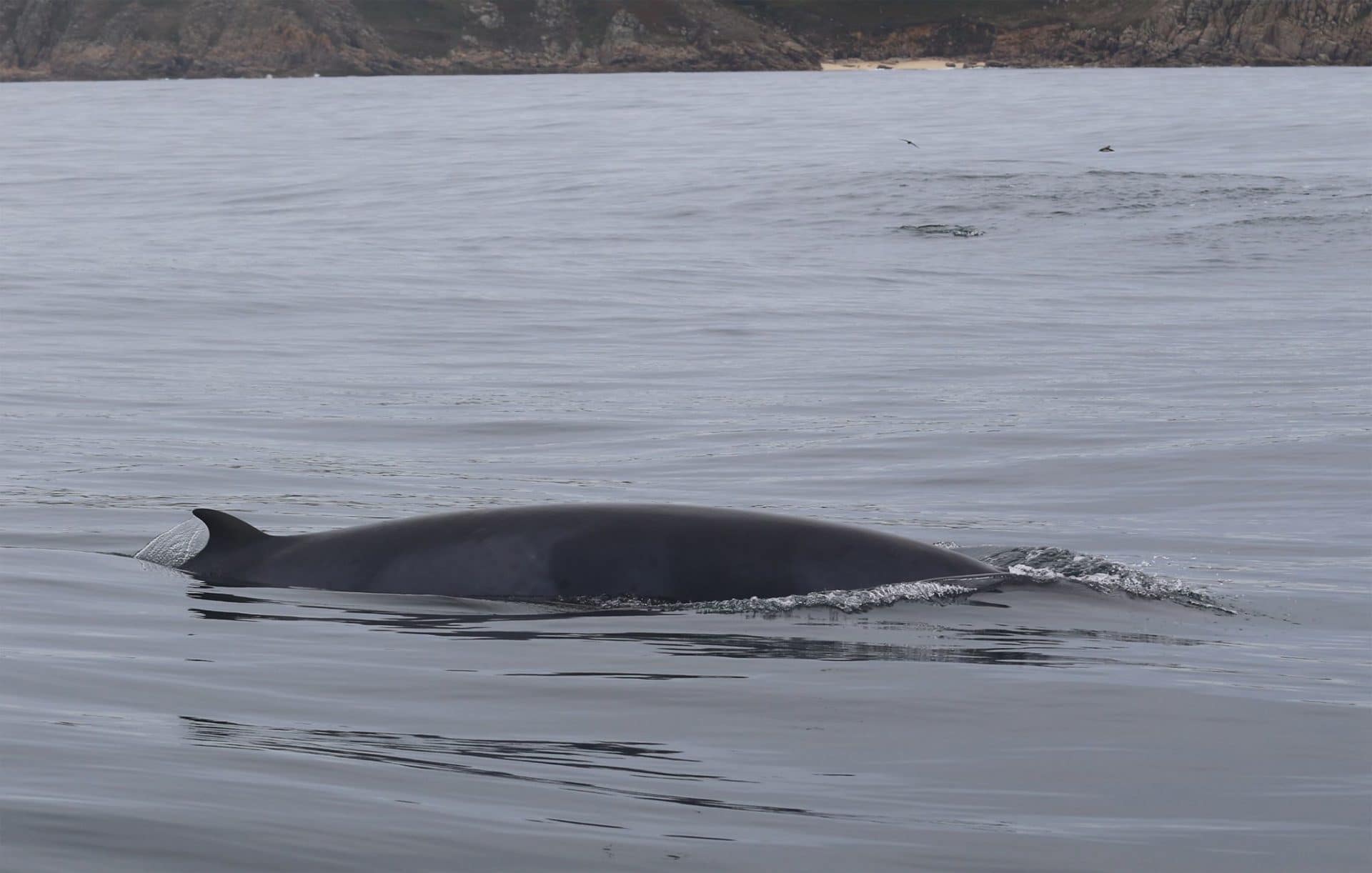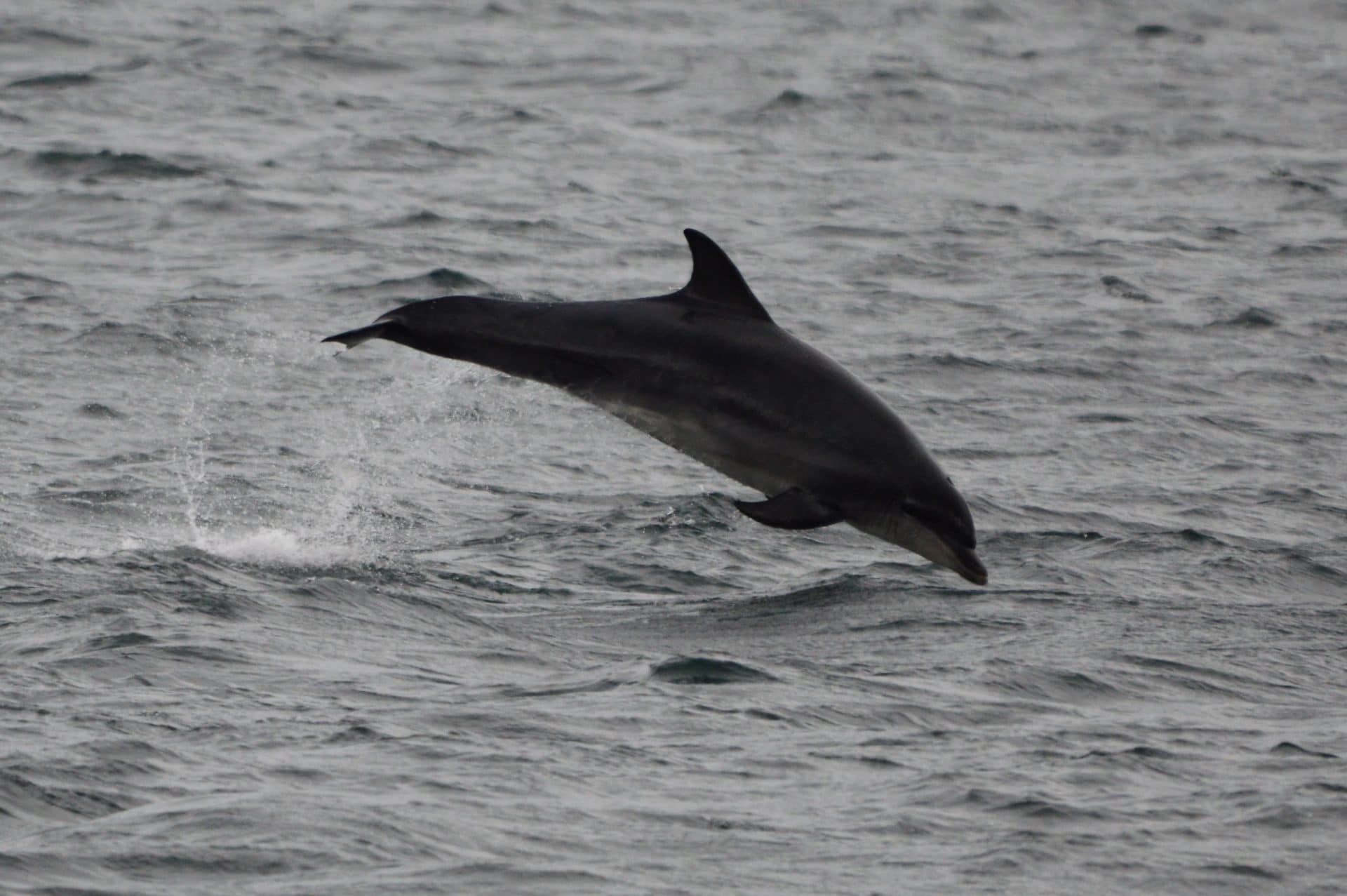Marine Life & Conservation
National Whale and Dolphin Watch 2018: the results are in!

2018 marked the 17th year of Sea Watch Foundation’s National Whale and Dolphin Watch event, a citizen science project which has gained tremendous popularity over the years.
Last year’s event, which took place 28th July – 5th August, revealed striking biodiversity with an impressive 13 species of cetaceans seen around the British Isles in just those few days, a number which was only been recorded once before. The total number of sightings collected was larger than last year, and the highest reported so far. The 2018 event totalled 1,328 hours of watches conducted, over 100 hours more than in 2016. Over 43% of the total amount of hours spent collecting effort-related data came from land-based locations.

Students from the University of Hull conducting a land watch from Filey Brigg. Photo credit: University of Hull
“I am very proud of what we achieved with the help of wildlife enthusiasts and conservation and recording organisations around the country, who have contributed data collected from boats (inshore and offshore) and from land stations in different parts of the UK”, says Dr Chiara Giulia Bertulli, organiser of this year’s national event for the UK national research charity, Sea Watch Foundation.
South Grampian, Outer Hebrides, South Devon, Northeast and Northwest Scotland as well as West Wales are at the top of the list with sighting rates far superior to “2” (indicating an average of two or more cetaceans seen per hour of watching). Based on this year’s results, the UK’s national average sightings rate has increased compared to last year with over one cetacean seen for each hour of watching.
“The most memorable sightings from this past year’s Watch week”, adds Chiara, “include humpback whales in Yorkshire and Aberdeenshire, striped dolphins live stranding in South Wales, Sowerby’s beaked whale in East Lothian, fin whales in Northeast Scotland and Outer Hebrides, and large pods of short-beaked common dolphins off Puffin Island and Menai Bridge in North Wales.”

Common minke whale photographed off Penzance, Cornwall, on August 3rd. Photo credit: Hannah Jones / Marine Discovery Penzance
During the 2018 NWDW event, species such as harbour porpoise, bottlenose dolphin, and minke whale continued to have a widespread coastal distribution and, as the results show, most of their sightings were actually recorded in coastal waters from land. Short-beaked common dolphins, an ocean species known for their offshore distribution, were mainly sighted from motorised vessels. Striped dolphins, which were only recorded once were also sighted from a vessel. Atlantic white-sided dolphins were sighted six times, and, unusually, 83% of those times it was from land.
The ability to detect cetaceans and collect sightings information is strongly affected by several weather parameters such as sea state, glare, swell height and visibility. When the weather deteriorates due to strong winds and/or heavy rain, watches may even be cancelled altogether as conditions are no longer suitable to collect presence and absence data. Taking this into account, every year, NWDW is organized over a period of nine days to increase the chances of getting favourable weather conditions to conduct land and boat watches at different sites around the UK. Last year, weather was changeable, with temperatures generally well above average.

Bottlenose dolphins photographed off Berwick-upon-Tweed, Northumberland, on July 31st. Photo credit: Amber Thomas
Of the species recorded during the 2018 NWDW event, the harbour porpoise was the most commonly seen in most parts of the UK, followed by bottlenose dolphin, short-beaked common dolphin and common minke whale.
With regards to the distribution of cetacean sightings around the UK, Scotland recorded the highest number of sightings, with the most sightings coming from South-West Scotland and Inner Hebrides, Outer Hebrides and North-West Scotland. England was second with the neighbouring regions of Cornwall, South Devon providing the most sightings followed by Yorkshire. Wales placed third with West Wales collecting most of sightings. Around the Channel Islands, observers reported 26 sightings, and there were nine reports from around the Isle of Man. Six sightings were also recorded in Northern Ireland.
Sea Watch Foundation are seeking volunteers to come forward to take part in the National Whale and Dolphin Watch 2019 this summer, which takes place 27th July – 4th August. Surveys can take place from your favourite or closest bit of coastline and boat-users are urged to get in touch too. No experience is necessary as the team at Sea Watch will offer you training and advice on how to take part.
 Download a copy of the full 2018 National Whale and Dolphin Watch report HERE.
Download a copy of the full 2018 National Whale and Dolphin Watch report HERE.
Find out more about the 2019 NWDW event HERE.
Anyone interested in spending more time looking for whales, dolphins and porpoises around the UK should visit the Sightings Network webpage at www.seawatchfoundation.org.uk/regional-groups or submit their sightings online at www.seawatchfoundation.org.uk/sightingsform.
Marine Life & Conservation
Paul Watson Released as Denmark Blocks Japan’s Extradition Bid

Renowned anti-whaling activist Paul Watson has been released from custody in Greenland after spending five months in detention. Denmark’s Justice Ministry rejected Japan’s request for his extradition, citing insufficient guarantees that his time already served in custody would be credited against any potential sentence.
The 74-year-old Canadian-American was arrested on July 21 in Nuuk, Greenland’s capital, when his ship docked to refuel. His arrest was based on a 2012 Japanese warrant related to a 2010 encounter in Antarctic waters. Japan alleged Watson obstructed operations and caused damage to a whaling research ship during efforts to disrupt illegal whaling. Watson has consistently denied these claims, maintaining his commitment to marine conservation.
Denmark, which oversees extradition matters for Greenland, concluded that while the legal conditions for extradition were met, the lack of assurances from Japan regarding time-served credit made extradition untenable.
In a video shared by his foundation, Watson expressed gratitude and relief, saying, “After five months, it’s good to be out… and good to know they’re not sending me to Japan.” He added that the most difficult part of his time in custody was being separated from his two young sons.
Watson is a pioneering figure in marine conservation, known for founding the Captain Paul Watson Foundation in 2022 after decades of activism with the Sea Shepherd Conservation Society. His bold efforts to defend marine life have earned him widespread support, including from celebrities and conservationists. His work has also been featured in the acclaimed reality TV series Whale Wars.
Watson’s lawyer, Jonas Christoffersen, praised the decision, stating, “We are happy and relieved that Paul Watson is now free.” He added that Watson is eager to reunite with his family and continue his vital work.
The arrest occurred while Watson’s vessel, the M/Y John Paul DeJoria, was en route to the North Pacific with a team of 26 volunteers to intercept a Japanese whaling ship. His foundation described the arrest as politically motivated and emphasized that Watson’s actions were focused on ending illegal whaling practices.
Japan resumed commercial whaling in 2019 after leaving the International Whaling Commission, asserting that whale meat is a cultural tradition. Conservationists, however, continue to challenge these practices, highlighting their impact on marine ecosystems.
Despite the challenges, Watson remains steadfast in his mission to protect marine life and bring attention to whaling practices. His dedication to ocean conservation has made him a globally respected advocate for the environment.
Marine Life & Conservation
12 Days of Zero-Waste Fish-mas

This holiday period, the Marine Conservation Society, the UK’s leading ocean membership charity, invites you to make some simple changes to eating fish this Christmas to help our seas.
Dr Kenneth Bodles, Head of Fisheries and Aquaculture at the Marine Conservation Society, said, “During the festive season, our consumption increases, but so does waste. Sustainability isn’t just about where food comes from – it’s also about how you use it. By reducing waste and making the most out of your seafood, you’re not only taking steps to be more ocean-friendly, but can also help to cut costs during what is often one of the most expensive times of the year”.
The Marine Conservation Society has compiled twelve tips on how to consume seafood sustainably with zero-waste this Christmas:
Buy whole fish instead of fillets
Instead of fillets, consider buying whole fish such as salmon, hake, or lemon sole. By adopting a “nose to tail” approach with cooking, whole-baked fish not only feeds a crowd, but also helps to minimise waste and maximise sustainability by using up every part of the animal, including bones, skin, and fat.
Make fish stock
Leftover fish bones or shells can be put to good use by boiling them to make a nourishing fish stock or bisque. This can be frozen and preserved for later use and makes for a flavourful base in a soup.
Make your own fish pâté
Avoid waste by turning leftover fish, such as smoked mackerel or salmon, into a delicious pâté by blending with cream cheese and lemon. Perfect when paired with crackers.
The sustainability of salmon and mackerel varies depending on where and how it is caught or farmed. For more information on green-rated options, check the charity’s Good Fish Guide.
Buy frozen
By purchasing seafood that is frozen or vacuum-packed, this helps to reduce waste by extending the shelf life of your food.
Fish pie
If you’re wondering what to do with leftover cooked fish, why not opt for a classic fish pie with mashed potatoes, leeks, and a cheesy sauce? A sure crowd pleaser on Boxing Day.
Use the head
Don’t forget the fish head! The meat is incredibly tender and flavourful. The charity recommends a cod’s head curry or recreating Fallow’s renowned cod’s head in siracha butter.
By stretching your ingredients further, not only is this a more sustainable way to enjoy seafood, but also cost-effective by repurposing leftovers and cooking creatively.
Boxing Day brunch
Mix leftover kippers or smoked salmon with scrambled eggs for a tasty, zero-waste, Boxing Day brunch.
For best choice, make sure you buy kippers, or herring, from the North Sea and the North Irish Sea.
Zero-waste storage
A top tip from the Marine Conservation Society to avoid waste is freezing fish offcuts to save for future use.
Crisp up the skin
Even leftover fish skin can be turned into a quick savoury snack by crisping it up in an air fryer with a little olive oil and salt.
Anchovies two ways
Leftover anchovies can either be blended with butter to make a delicious anchovy butter or tossed into pasta for a hit of umami flavour.
The charity recommends opting for anchovies caught in the Bay of Biscay for best choice.
Fishcakes
For an easy, zero-waste meal, leftover seafood trimmings can be mixed with mash and fried in breadcrumbs to make fishcakes.
Pickled mussels
Try pickling mussels in 1:1 vinegar and water, with a dash of sugar for a sustainable, zero-waste snack that can be enjoyed well beyond the festive season.
Mussels farmed in the UK are a seafood superhero. Grown using low-impact methods and harvested by hand, they get all the food they need from the sea around them. This makes them one of the most sustainable, ocean-friendly, and cost-effective seafood options.
Players of People’s Postcode Lottery have raised £6.6M towards the Marine Conservation Society’s vital work in making seafood more sustainable.
Laura Chow, Head of Charities at People’s Postcode Lottery, said: “Fish is a festive favourite for many, but making sustainable choices when it comes to how we buy and eat seafood makes all the difference for our ocean. Support from players of People’s Postcode Lottery has helped the Marine Conservation Society further its sustainable seafood work, so that we can all enjoy healthier, better protected seas.”
The Marine Conservation Society encourages you to make sustainable seafood choices a year-round habit, not just for Christmas. To check how sustainable the seafood on your plate is, you can visit the charity’s Good Fish Guide. The Guide helps consumers and businesses identify the most sustainable seafood using a simple traffic light system, based on where and how species are caught or farmed. Green is the best choice, amber means improvements are needed, and red indicates fish to avoid buying.
Zero-waste gift idea
Why not embrace a zero-waste Christmas by gifting a membership to support marine conservation? It’s a meaningful, low-waste gift that helps protect our ocean for generations to come. Memberships start from as little as £5 a month – the price of a sandwich and drink from your local coffee shop.
Find the latest sustainable seafood advice for wild-caught and farmed seafood on the Good Fish Guide, downloadable to your phone from www.mcsuk.org/goodfishguide.
-

 News3 months ago
News3 months agoIconic SS United States to become the World’s Largest Artificial Reef
-

 Blogs2 months ago
Blogs2 months agoScubaverse Christmas Gift Guide 2024: Day 4
-

 News2 months ago
News2 months agoSanta Divers take the Plunge for Charity
-

 Blogs2 months ago
Blogs2 months agoScubaverse Christmas Gift Guide 2024: Day 1
-

 News3 months ago
News3 months agoDiscover Turquoise Divers and Media Luna Beach & Dive Resort: A Premier Diving and Relaxation Destination in Roatan
-

 Blogs2 months ago
Blogs2 months agoScubaverse Christmas Gift Guide 2024: Day 5
-

 Blogs2 months ago
Blogs2 months agoScubaverse Christmas Gift Guide 2024: Day 2
-

 News3 months ago
News3 months agoToucan Diving at Plaza Beach and Dive Resort Bonaire Introduces PADI Mermaid Training



